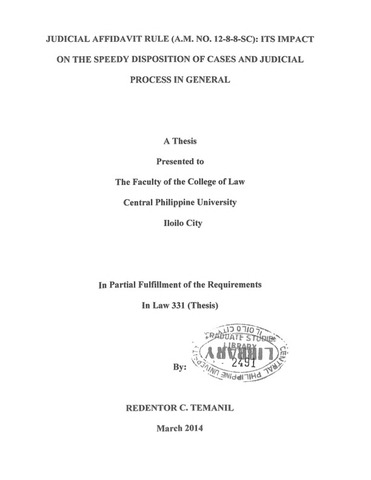Judicial Affidavit Rule (A.M. no. 12-8-8-sc): Its impact on the speedy disposition of cases and judicial process in general
| dc.contributor.adviser | Alibogha, Salex E. | |
| dc.contributor.author | Temanil, Redentor C. | |
| dc.date.accessioned | 2021-06-02T07:43:48Z | |
| dc.date.available | 2021-06-02T07:43:48Z | |
| dc.date.issued | 2014 | |
| dc.identifier.citation | Temanil, R. C. (2014). Judicial Affidavit Rule (a.m. no. 12-8-8-sc): Its impact on the speedy disposition of cases and judicial process in general (Unpublished postgraduate thesis). Central Philippine University, Jaro, Iloilo City. | en_US |
| dc.identifier.uri | https://hdl.handle.net/20.500.12852/969 | |
| dc.description.abstract | It has been said that justice delayed is justice denied, and oftentimes, this dictum has proven to be true in the Philippine justice system. Nevertheless, lawyers are not the lone ones who are blameworthy of delaying tactics and strategy, court dockets are often congested and different legal issues often yield up that need spare time to be decided upon. Hence, our laws do have safeguards to warrant the punctual and speedy action on all types of legal actions and cases. Still, we cannot escape from the reality that our courts in the Philippines are on a situation of constant battle. They are in combat in resolving the helm of justice that turn so slow and the taking years to resolve cases and clogged dockets which in turn the delivery of justice gets delayed most of the time. Henceforth, where is the constitutional guarantee for speedy disposition of cases in our judicial system? But one thing for sure is that people would not go to court to litigate their case if they do not believe that there is still justice in our bench. Of course people still believe that courts are the easiest way to resolve controversy and the ultimate means to redress the wrong committed by our fellows. Many consider courts as arena of justice and equity but still many doubts on its probity and honesty in bringing up its ideal picture for a couple of reasons. Some would think that it could not expedite cases with fewer expenses from the time issues and controversies have been raised from litigation until final judgment has been rendered. And unfortunately, the more the courts lost its integrity the harder it regains respect the moment the people litigating their case felt being cheated and deprived of its right in court litigation. In effect, not only our people and courts but also our economy and foreign investors are affected by such real situation in our judicial system. We cannot say that our courts, our judges and prosecutors are the ones to be blamed in general. In fact, they are intelligent, the most capable ones and indispensable personalities in our judicial system. The researcher believes they possess the qualities our judiciary cannot live without their help and knowledge. The lawyers and judges' commitment to ethics and integrity, their strong knowledge to constitutional law, their high intelligence and excellent reasoning skills are the factors that developed the standard we needed most in our courts. But why is it that many questions in our judicial system remained unresolved up to the point that these questions became a problem and a reality which were not dispensed with for a long time and century of years of our practice and service? One of these big problems we handled is the clogging of dockets in our courts that remained unresolved since then and up to this time. But our judiciary never stop in discovering a good solution that would bring us hope and optimism in discharging baggy dockets in court. The court of laws did not remain inattentive on this matter when on September 4, 2013 the Supreme Court issued A.M. No. 12-8-8-SC, approving the Judicial Affidavit Rule. The rule took effect on January 1, 2013, following its publication in two newspapers of general circulation. This new rule which was approved by the Supreme Court justices unanimously last September, provides that when a party, whether plaintiff or defendant, is asked by his counsel regarding his testimony in the form of judicial affidavit, the counsel no longer needs to place the witness on the witness chair for direct examination. As a substitute to the direct testimony of the witness, the party or his lawyer merely submits in court and to the opposing party the written sworn statement of his witness in a question-and-answer format. It shall also require each party to the case to attach all his documentary evidence to the judicial affidavit, which in turn must be submitted atleast five days before the pre-trial or preliminary conference in the case. This proves that our judiciary is looking for the best to reach its objective in their program to reach judicial reforms. | en_US |
| dc.format.extent | i, 79 leaves | en_US |
| dc.language.iso | en | en_US |
| dc.rights | Attribution-NonCommercial-NoDerivs 3.0 Philippines | * |
| dc.rights.uri | http://creativecommons.org/licenses/by-nc-nd/3.0/ph/ | * |
| dc.subject.ddc | GSL Theses 340.72 T24 | en_US |
| dc.subject.lcsh | Affidavits | en_US |
| dc.subject.lcsh | Judicial process | en_US |
| dc.title | Judicial Affidavit Rule (A.M. no. 12-8-8-sc): Its impact on the speedy disposition of cases and judicial process in general | en_US |
| dc.type | Thesis | en_US |
| dc.description.bibliographicalreferences | Includes bibliographical references | en_US |
| dc.contributor.department | College of Law | en_US |
| dc.description.degree | Juris Doctor | en_US |
| local.subject | Judicial Affidavit Rule | en_US |
Files in this item
This item appears in the following Collection(s)
-
Juris Doctor [144]



